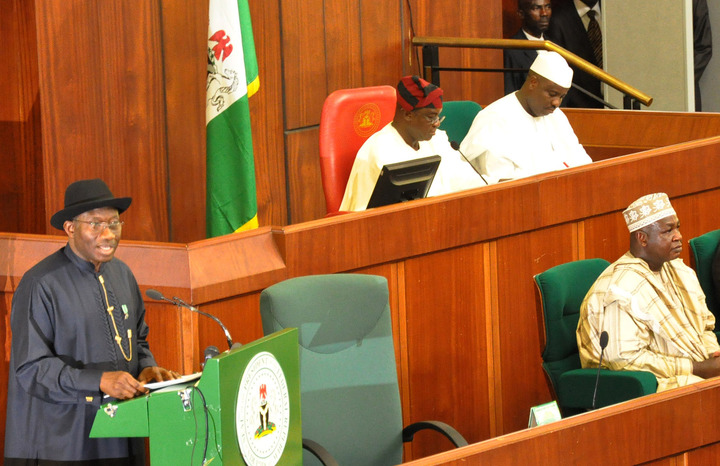FG debunks AfDB report on the Nigerian economy
The Federal Government on Monday reacted to the African Development Bank (AfDB), that rated Nigeria’s economy is less than desirous.
Minister of Information, Labaran Maku, in a press statement refuted claims that the country is not doing well.
Defending the President Goodluck Jonathan-led administration, Maku said the government has undertaken significant policy reforms targeted at addressing the challenges identified in the report.
Below is the statement
1. Reports in several print and social media have cited the African Development Bank (AfDB) in its 2013 African Economic Outlook as rating Nigeria’s poverty reduction drive “low”. We believe it is necessary to dispel the bogus claims and disingenuous innuendos contained in the report, and instead invite attention to the steady progress the country is making in creating wealth and reducing the ranks of the poor.
2. In the first place, the Nigerian economy is doing much better than any other of its size on the continent, and the poverty statistics which were rehashed by the media from the 1996–2010 figures on which the AfDB report is based have been overtaken by the various interventions by President Goodluck Jonathan’s administration in the last two to three years.
3. The facts even in today’s newspapers (Monday12 August 2013) including Businessday and the Nation Newspaper Editorial, speak of a Nigerian economy that is witnessing impressive growth and improvement in performances in our schools.
4. It is pertinent to point out that we are growing the Nigerian economy faster than any other country’s economy on the continent, with this year’s GDP growth put at 6.7%.
5. Nigeria remains the highest destination for Foreign Direct Investment inflows into Africa over and above South Africa and Egypt. This is the direct result of the fundamental reforms being implemented under President Jonathan’s Transformation Agenda.
6. The Nigerian Capital Market has fully recovered, recording impressive performance as reported in the front page lead story of Businessday today (Monday, 12 August 2013).
7. Our public schools are gradually recovering from decades of decline as WAEC performances have risen to 64.2% from 39.57% of students who pass with minimum of five credits (The Nation’s Editorial Monday, 12 August 2013).
8. The Trains are back on our railways from Lagos to Kano, while we fix the Port Harcourt-Maiduguri line in readiness for use by 2014. New standard gauge Rail-Lines are in the works from (Lagos-Ibadan; Abuja-Kaduna; Warri-Ajaokuta-Itakpe; Abuja City Light Rail; etc).
9. Our Airports terminals now look like modern airports with space and beauty.
10. Reforms in the Power Sector and the new power projects being completed will stabilise power from next year.
11. Our Gas Master Plan has attracted huge investments by Chevron, Shell, Dangote Group and other investors who are now transforming our gas into major income earner for the country.
12. New Industrial City at Ogindingben in Delta State is unfolding with the construction of a petro-chemical industries complex. About 100,000 workers will be employed for the construction phase, which has begun.
13. New Gas Pipelines are on the way from the South-South to the North and South-West to utilise gas for power generation and for the domestic economy.
14. These and many more are the reasons why the opposition is desperate to highlight negative stories taken from outdated statistics which ignore current efforts and results, just to give the opposition opportunity to mislead Nigerians.
15. As earlier stated, it is important to point out that the AfDB report is a dated report considering that the data being referred to cover between 1996 and 2010. Over the past 2—3 years, the administration of President Goodluck Jonathan has done a lot to fight poverty, create jobs, and reduce inequality. This government has undertaken significant policy reforms targeted at addressing the challenges identified in the report. These policy interventions have contributed positively to turning things around beyond the picture painted in the report.
16. Poverty is a national challenge that transcends the whole country cutting across party divides. In reality, the responsibility of fighting poverty does not rest solely with the Federal Government. States and Local Governments share in this responsibility too. State governments hold the key to fighting poverty in their states. Dealing with poverty as a partisan phenomenon would be trivializing the problem. All hands need to be on deck to fight poverty. Federal Government efforts are mainly at the policy level, while actual projects/programmes are carried out by the states. In spite of this, Federal interventions to reduce poverty have taken place in Agriculture; Health; Education; Housing; Communication Technology; Works; Transportation and other sectors of the economy.
17. The AfDB report presents poverty, inequality, and unemployment in Nigeria without the appropriate and illuminating global context. Yet, these three challenges have increasingly become global issues, which policymakers around the world are grappling with everyday. For example, South Africa’s unemployment rate and Gini Coefficient, which measures the dispersion in income and wealth amongst individuals, is 26% and 0.63, respectively, compared to Nigeria’s 24% and 0.45. The Gini Coefficient for other comparator countries like Brazil, China, and Singapore are 0.52, 0.47, and 0.48, respectively. Despite our favourable comparisons, these numbers trouble us. And that is why the Administration of President Goodluck Jonathan has been working very hard to address them.
18. Unemployment—One of the main goals of this Administration has always been to ensure that every Nigerian who is willing and able to work can indeed find a job. Therefore, every aspect of the Transformation Agenda, from fiscal consolidation and privatization to macroeconomic stability and deregulation, is geared toward creating an enabling environment for private sector job creation. That is why the ongoing Power Sector reform and investment in roads, rail, and other infrastructure are so important. On the private sector side, the government’s effort in creating this enabling environment is paying significant dividends. Results from the latest job creation survey by the National Bureau of Statistics (NBS) indicate that the private sector had a significant share of the 405,000 jobs created in the country during the third quarter of 2012. In agriculture alone, our reform drive created about 2 million jobs in the sector in the last two years.
19. The government’s efforts on the public sector side also deserve to be highlighted. In particular, the YouWin Programme, which is entering its third year, has already created over 12,000 jobs across the country. The Programme is expected to create up to 80,000 more jobs by 2015. Of the 370,000 jobs expected under the Community Services Scheme funded by the SURE-P, 178,000 youths are already employed, while the Graduate Internship Scheme is expected to place about 50,000 graduates across the country. These are separate from the regular recruitments taking place across the Federal Civil Service and the Military and Para Military Services.
20. Poverty and Inclusion—This administration has focused on critical reforms in all key sectors of the economy. For example, the reforms in the agricultural sector have created much more transparency in the distribution of fertilizers to farmers, and established an E-Wallet system of input delivery to farmers. These reforms have continued to support strong growth in the sector. In recognition of the fact that growth in the Agricultural Sector is pro-poor, we are confident that the consistent growth being recorded in agriculture will translate into poverty reduction in the short to medium term.
21. Indeed, Nigeria was recently honoured for meeting the Millennium Development Goal (MDG) of reducing people living in absolute hunger by half well ahead of the 2015 target set by the United Nations. This administration recognizes that “inclusive growth” can only occur when a large part of the country’s labour force participates and contributes to economic growth through shared opportunities. That is why this government is focusing on sectors that can create jobs for people at the bottom, including Mass Housing, Solid Minerals and Mining.
22. The Federal Ministry of Health has also outlined a Vision to Save One Million Lives and improve the Quality of Care in our Health Facilities by 2015. Over 433,000 lives were saved in 2011 and 2012 by scaling up 6 cost-effective interventions in maternal and child health, nutrition, prevention of Mother to Child transmission of HIV, provision of essential commodities, malaria control, and routine immunization. The Offices of MDGs and SURE-P, as well as the private sector, have also supported the health sector.
23. On the SURE-P front alone, over 9,000 frontline health workers have been recruited, trained, and deployed. In addition, about 1,500 primary health care facilities have been refurbished and supplied with essential materials across the 36 states and the FCT. With regard to Education, about 13 States have benefited from the construction of special girls schools and 124 Almajiri Schools have been constructed to reduce the number of out-of-school children in the north.
24. We are confident that these measures which were not covered by the AfDB report, have contributed significantly to reducing poverty and inequality in the country.
25. The AfDB report based on 1996-2010 statistics is therefore behind time and does not reflect the real achievements/results of this administration in tackling poverty and unemployment in Nigeria in the last three years.
LABARAN MAKU
HON. MINISTER OF INFORMATION









Wale
August 13, 2013 at 8:37 pm
That is all the Nigerian Government is known for: Debunking conclusions reached by local and foreign EXPERTS, setting up Committees to look into Enquiries which were set up to look into Panels appointed to tackle pressing issues, Pay lip service to passing of important bills E.G. PIB bill etc then pass in record times bills that have no major bearing on the polity E.G. Legal age for females to marry/denounce citizenship, criminalize homosexuality, Selective judgments of lengthy prison sentences 8-10 years for civil thefts of thousand Nairas while public embezzlements of trillions, billions and millions of Naira by the GOVERNMENT officials go unpunished or gets wrist slaps or plea bargains etc
Instead of the GEJ government to read the AFDB report critically to compare and contrast with its real performance and implement any expert recommendations, it would rather spend colossal public funds on image laundry and dry-cleaning while wining and dining public resources away.
God bless my country Nigeria, Amen.
Chris Dee
August 16, 2013 at 4:18 pm
Responding to the AFDB report is a good avenue for the government to say what they are doing and have accomplished. How else would we really know that since 2010, things have been implemented. It is a continuous process. Hats off to the government on attracting FDI, the employment strategy and the focus on education. Investing in human capital has a positive ripple effect